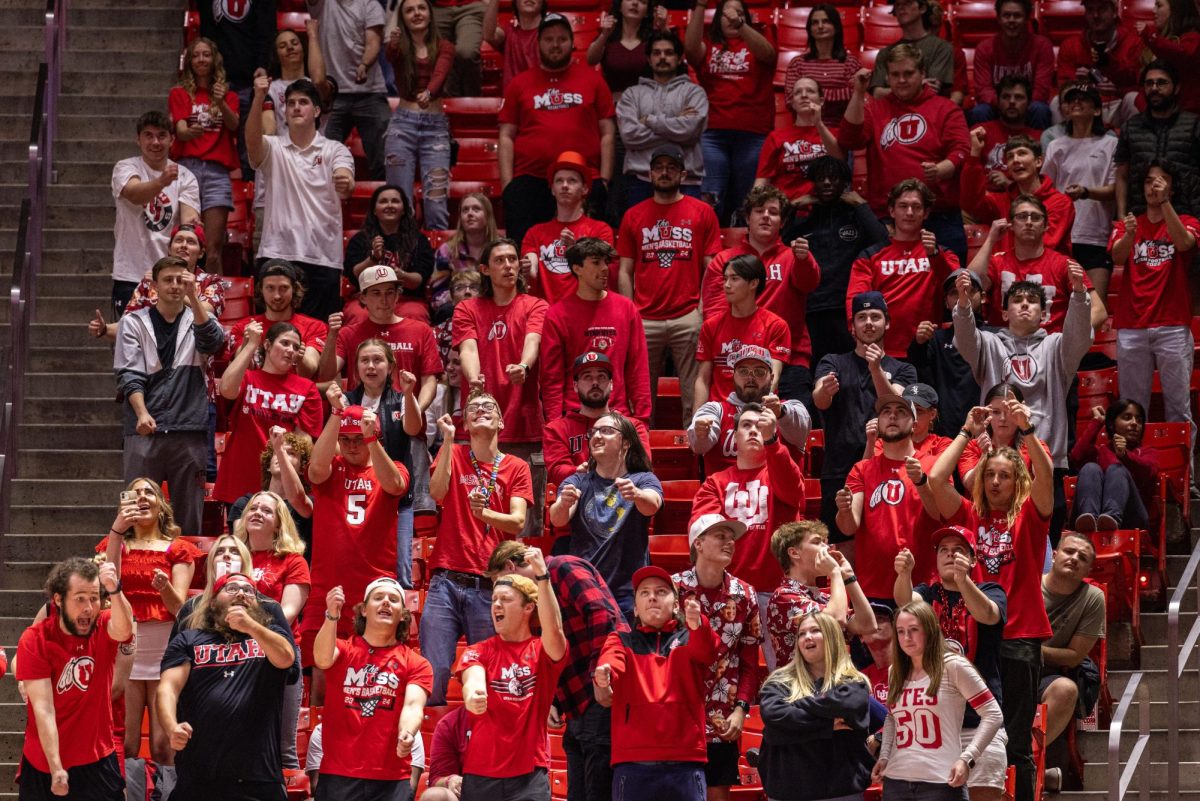What Does the COVID-19 Stimulus Package Look Like for College Students?
Can students get benefits from the new coronavirus stimulus package? It’s complicated. (Photo by Cassandra Palor | Daily Utah Chronicle)
April 10, 2020
On March 27, 2020, President Trump signed a $2 trillion coronavirus stimulus package that is meant to keep the economy afloat in this time of unprecedented economic downfall.
Many college students are among those hurt by the economic fallout. Students have been forced to leave university housing, laid off from jobs and struggled to cover existing expenses.
Right after the University of Utah announced the move to online classes, Devon Cantwell, a Ph.D. student in the Department of Political Science, created a survey to measure student needs and concerns about school going online, jobs being shut down and various other changes.
369 respondents answered the survey in about 15 hours. Cantwell found the top concern among those students was the potential loss of income from on-campus employment or employment that relies on the university.
“I decided to make the survey because many universities nationally (most notably Harvard, Yale, etc.) have made quick decisions to close campuses completely, which have had devastating consequences on low-income and first-gen students,” she said.
Financial concern and uncertainty are widespread at this time, and this bill seeks to “patch some holes up,” said Norman Waitzman, the economics department chair and professor at the U.
According to the Internal Revenue Service website, individual tax filers with adjusted gross income up to $75,000 will receive the full $1,200, and married couples who filed joint returns with an income of up to $150,000 will receive the full $2,400. They will also receive an additional $500 for each child under the age of 17. Single filers exceeding a gross income of $99,000 and married couples exceeding $198,000 will not receive any check.
“Basically, what it is trying to do is just keep people afloat to some extent,” Waitzman said. “In broad brush strokes, what we’re seeing here is at least an attempt to try to get money into people’s individual’s hands.”
This bill differs from stimulus bills in the past by providing direct assistance to individuals. In contrast, the 2008 Troubled Asset Relief Program was directed towards bailing out banks. Even after the program, many Americans lost their homes during the Great Recession.
Waitzman has several concerns about the coronavirus relief package. He says the bill is unclear on when or how people will receive this money. “How this is executed becomes very important. And I suspect there’s going to be considerable delays and some error in the system,” he said.
Waitzman also pointed out that $1,200 will not be a sufficient amount of money for many people to cover expenses, including rent, groceries, child care and transportation. “In many cases, this will be a drop in the bucket with respect to the hemorrhaging that’s occurring with respect to the flow of funds,” he said.
Although the goal of this legislation is to help those struggling, many college students might not qualify for any check. Even if students file their own taxes, those claimed as dependents on someone else’s taxes will not qualify. This can include college students — even if they work and file their own taxes — those under the age of 24 whose parents pay for over half their expenses and people with disabilities.
Also, if students were taking full-time classes and did not have any employment, they will not qualify for the check.
“They need to meet their rent and their groceries still, there might be some tuition payments that ultimately have to still face, and this is of some concern under this bill. There are some people that have fallen through the cracks,” Waitzman said.
For students who do qualify, there could still be some confusion. Students tend to move frequently, and many students have suddenly moved in with family members after the COVID-19 outbreak. Because of this, checks could easily get sent to the wrong address.
If a person made over $75,000 last year but not this year, they are technically still entitled to the $1,200 check. However, they would have to prove this change in income to the government, which could delay the payment until the end of the year, Waitzman said.
Waitzman said that while many college students might not qualify for a check even if they lost their job, they can apply for unemployment benefits. The unemployment qualifications have been expanded to include part-time workers and those who are self-employed.
Those receiving unemployment benefits qualify for weekly $600 payments for up to 13 weeks. Waitzman also suggests looking into health insurance through Medicaid. The U also has an emergency fund that is available for students.
While the situation may be confusing and unprecedented, Waitzman said students who are struggling financially should exhaust all of their options.
“Keep at the unemployment office. Persevere, put it on speaker and [wait on the phone] … until you get a live voice to tell you exactly what to do,” he said.
Waitzman hopes that the government will continue to assist people struggling during the COVID-19 pandemic. “I hope that the country mobilizes in the near future to provide the type of culture and care that we were known for in our crises, like World War II and in the Great Depression,” he said.
n.colby@dailyutahchronicle.com
Editor’s note: Signs and symptoms of COVID-19 include fever, dry cough, tiredness and shortness of breath. These symptoms are believed to occur between two and 14 days after a person is exposed to the disease. If you have these symptoms and have recently come into contact with a person who is known to have COVID-19, or if you have recently traveled to an area with community spread of the disease, you should call your doctor. Areas with community spread of COVID-19 are believed to include China, South Korea, Italy, Iran and Seattle. If you do not have a doctor who you visit regularly, please call the Utah Coronavirus Information Line at 1-800-456-7707 or the University of Utah Health hotline at 801-587-0712. Do not go to a healthcare facility without first making arrangements to do so.













Rebecca Mcvay • Apr 29, 2020 at 11:10 am
I am an online doctoral student who was advised that the covid CARES act for universities will not apply to online students. This is one of the worst decisions that the Department of Education could make. I have to travel across the US for my residency programs and my dissertation which could take months. These payments are not included in tution along with this being said “WE” as doctoral online students pay higher tution costs than any other student as well as fees for everything we have to do for our degree program. Since our campus was closed my residency was canceled, now I am stuck with an airine ticket that is non refundable and non transferable and now past its usage date as this residency was scheduled for March 27th-March 31. Not only did I along with other students ose money on airfare, we as well lost fees that had to be paid in advance for the residency that we were attending. Basically I am saying that as an online Doctoral student my expenses and student loans are four time the amount of a freshman 18 year old on campus, yet they will receive somewhere around $100,000 for this bill and I along with every other online student will receive nothing, not to mention that we have been hit harder than those young persons who went home to their parents. Not to mention we have to pay for our internet, computers, books, and anything else we need for class all year to be able to maintain our course work. My company had to close and I am unable to work and live in Louisiana where we have extended our stay at home order through May and our cases of covid 19 have not peaked. 14 Billion for students but no help for those like me who have been in college for 8 years, to become a Doctor so that maybe I would be able to help and find a cure for this or the next disease we face. How is this fair and who makes a decision like this. Now everyone is an online student! In every level of education. That money could refund my lost fees, refuns my airfare for my canceled residency, help my family stay afloat unti we can leave our homes, open our businesses and get back to normal.